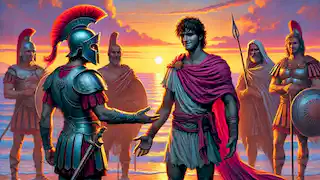The Story of the Elysian Fields
Reading Time: 10 min
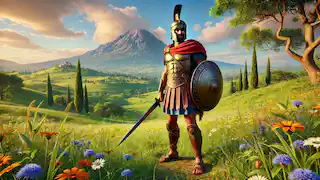
About Story: The Story of the Elysian Fields is a Myth from greece set in the Ancient. This Dramatic tale explores themes of Courage and is suitable for All Ages. It offers Cultural insights. A warrior’s epic quest for eternal honor in the mythical Elysian Fields.
In ancient Greek mythology, the Elysian Fields, also known as Elysium, were the ultimate resting place of heroes and those chosen by the gods. Situated beyond the mortal world, this paradise was a realm where the souls of the virtuous and the blessed resided in eternal peace and happiness. The legends surrounding Elysium were shaped by generations of poets and philosophers, creating a vivid image of a land where time stood still, and joy was everlasting.
This is the story of a young warrior named Callisthenes, whose journey to the Elysian Fields would change the fate of mortals and gods alike. His tale is one of honor, sacrifice, and the eternal question of what it means to live a life worthy of paradise. Callisthenes was born in the shadow of Mount Olympus, in a village where every child was raised on stories of the gods and their divine power. His father, a revered soldier, taught him the values of courage and loyalty. From a young age, Callisthenes dreamed of earning a place in the Elysian Fields, where the greatest heroes were said to dwell after death. But it was not enough to wish for such glory—he knew it must be earned through great deeds. As a young man, he became a warrior, defending his homeland from invaders and monsters alike. His bravery was unmatched, and his name became known far and wide. However, even after many victories, Callisthenes found no satisfaction in his achievements. There was something greater calling him, a destiny that lay beyond the bloodshed and chaos of mortal life. One night, under the full moon, as Callisthenes rested by a fire after a long battle, a figure appeared from the shadows. It was the goddess Athena, her armor gleaming in the light of the flames. “Callisthenes,” she said in a voice both soft and commanding, “you have proven yourself worthy of the gods' attention. But there is one final test that will determine your place in eternity.” Callisthenes rose to his feet, humbled by her presence. “What must I do, my goddess?” Athena smiled. “You must venture to the gates of the underworld, cross the River Styx, and find your way to the Elysian Fields. But be warned—this journey is perilous, and few mortals have survived it.” With a solemn nod, Callisthenes agreed to the challenge. He knew that the path to eternal peace was fraught with danger, but he was determined to prove his worth. The next day, Callisthenes set out on his journey. His destination: the entrance to the underworld, a place known only to a few. Armed with his sword and shield, and guided by Athena's blessing, he traveled through forests, across rivers, and over mountains, seeking the dark caverns that led to Hades' realm. As he neared the entrance, the air grew thick with the smell of death, and the ground trembled beneath his feet. Before him stood a cavernous opening, its mouth wide and foreboding. The wind howled as if the very earth was warning him to turn back. But Callisthenes pressed on, determined to reach the Elysian Fields. Inside the cavern, the path was lit only by the faint glow of the torches he carried. Shadows danced along the walls, and the sound of dripping water echoed eerily around him. He walked for what seemed like days, until he came to the shores of the River Styx. There, the ferryman Charon awaited him, his skeletal figure draped in a dark cloak. In exchange for a coin, Callisthenes was allowed to board the small, rickety boat that would take him across the river. As they sailed through the mist, Callisthenes could see the souls of the dead, wandering aimlessly along the shores. Some reached out to him, pleading for help, but he knew he could not interfere with their fates. He focused on his goal, knowing that to falter now would mean an eternity in the underworld. After crossing the river, Callisthenes found himself standing before the gates of the underworld. Towering above him were the three judges of the dead: Minos, Rhadamanthus, and Aeacus. Their eyes, cold and piercing, gazed down upon him as they prepared to pass judgment. “Why do you seek entrance to the Elysian Fields?” Minos asked, his voice echoing through the chamber. “I seek to earn my place among the greatest of heroes,” Callisthenes replied boldly. “I have lived a life of honor and courage, and I wish to rest in the fields of eternal bliss.” Rhadamanthus narrowed his eyes. “You speak of honor, yet have you never faltered? Have you never known fear or doubt?” “I have known fear,” Callisthenes admitted, “but I have always faced it. And though I have doubted myself at times, I have never turned away from my duty.” Aeacus nodded approvingly. “Very well, Callisthenes. You will face one final test. Beyond these gates lies the Plains of Asphodel, a place where souls wander in endless limbo. You must cross these plains and reach the entrance to Elysium. But beware, for many lose their way and are trapped forever.” With that, the gates slowly creaked open, revealing the vast, desolate plains beyond. Callisthenes steeled himself for the journey ahead. The air was thick with the scent of despair, and the ground beneath his feet felt as though it would swallow him whole. The Plains of Asphodel stretched out before Callisthenes like an endless sea of pale flowers. The souls of the dead drifted aimlessly through the mist, their faces blank and devoid of emotion. As he walked, Callisthenes could feel the weight of their hopelessness pressing down on him. It was easy to see how one could become lost in such a place. The landscape was monotonous, with no landmarks to guide the way. Time seemed to have no meaning here, and every step felt like an eternity. But Callisthenes refused to give in to despair. He focused on the horizon, knowing that somewhere beyond the mist lay the entrance to the Elysian Fields. As he walked, he heard a voice call out to him. It was faint at first, but it grew louder with each passing moment. “Callisthenes... Callisthenes...” He turned to see a figure emerging from the mist. It was his father, the man who had taught him everything he knew about honor and courage. “Father?” Callisthenes whispered, his heart aching at the sight of the man he had lost so many years ago. The figure smiled sadly. “You have come far, my son. But you must be careful. The dead here are not as they seem. Many will try to deceive you, to lead you astray.” Callisthenes nodded, though his heart was heavy with grief. He knew that this was not truly his father, but a shade meant to test his resolve. With a final, silent farewell, he turned away and continued his journey. After what felt like days, Callisthenes finally saw it: the golden gates of Elysium, shining brightly through the mist. His heart soared with hope as he quickened his pace, eager to reach the paradise he had longed for. But as he drew nearer, he was confronted by a final obstacle. Standing before the gates was a monstrous creature, its body covered in scales, with the head of a lion and the tail of a serpent. This was the guardian of Elysium, tasked with ensuring that only the worthy could enter. “Who dares approach the gates of the blessed?” the creature growled, its eyes glowing with a fierce light. “I am Callisthenes, a warrior who has earned his place in the Elysian Fields,” he declared, standing tall before the beast. The creature snarled. “Prove your worth, mortal. Only those who have faced their greatest fears and emerged victorious may pass.” Callisthenes drew his sword, ready for battle. The guardian lunged at him with terrifying speed, its claws slashing through the air. But Callisthenes was swift, dodging the attack and striking back with precision. The battle raged on for what felt like hours, with neither side willing to yield. But eventually, Callisthenes saw an opening. With a mighty swing of his sword, he struck the guardian down, its body dissolving into mist as it fell. Exhausted but triumphant, Callisthenes approached the gates. As he reached out to touch them, they swung open, revealing the breathtaking beauty of the Elysian Fields beyond. The Elysian Fields were more magnificent than Callisthenes could have ever imagined. Lush green meadows stretched out as far as the eye could see, dotted with flowers that seemed to shimmer in the sunlight. A gentle breeze carried the scent of lavender and honey, and the sound of laughter echoed in the distance. He had finally reached the paradise he had longed for. As he stepped into the fields, he was greeted by the souls of the greatest heroes of Greece—Achilles, Heracles, and Odysseus, among others. They welcomed him with open arms, recognizing him as one of their own. For the first time in his life, Callisthenes felt at peace. The weight of his past battles lifted from his shoulders, and he knew that he had finally earned his place among the gods. But as he settled into his new life, Callisthenes could not shake the feeling that his journey was not yet over. He had achieved the glory he had sought, but at what cost? He had left behind a world still in need of heroes, a world where mortals struggled and suffered. One night, as he walked through the fields, Athena appeared before him once again. “You have done well, Callisthenes,” she said, her voice full of pride. “But there is one final choice you must make.” “What is it, my goddess?” he asked, his heart heavy with anticipation. Athena smiled. “You may remain here, in the Elysian Fields, and enjoy eternal peace. Or you may return to the mortal world, to continue your work as a protector of the people.” Callisthenes stood in silence for a long moment, weighing the decision before him. He had earned his place in paradise, but he could not ignore the call of duty. “I will return,” he said finally. “There is still much to be done.” Athena nodded, her expression softening. “Very well. You shall be reborn as a mortal, but you will retain the strength and wisdom you have gained in your journey.” And with that, Callisthenes felt the world around him fade away. When he opened his eyes, he was once again standing on the shores of Greece, his heart full of purpose and his soul at peace. Callisthenes' return to the mortal world was celebrated far and wide. He continued to defend his people, his strength and wisdom unmatched by any other warrior. But he no longer sought glory or recognition. Instead, he fought for the love of his people, knowing that true honor came not from victory, but from service. And though he would one day pass from this world again, Callisthenes knew that his place in the Elysian Fields would always be waiting for him. For in the end, it was not the battles he fought or the enemies he defeated that earned him his place in paradise—it was the love and sacrifice he gave to others. The story of Callisthenes and his journey to the Elysian Fields became legend, passed down through generations. His name would be remembered not as a warrior, but as a hero who understood the true meaning of honor.The Call to Adventure
The Descent into the Underworld
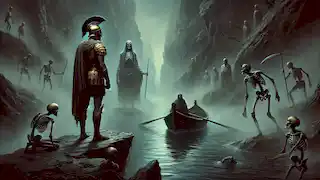
The Trial of the Three Judges
The Plains of Asphodel
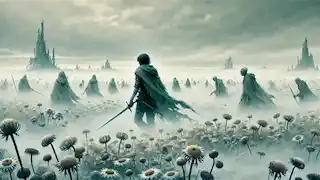
The Gates of Elysium
The Eternal Rest
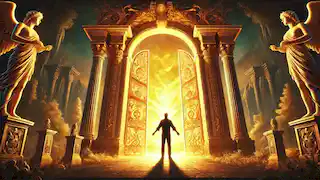
Epilogue: The Return of the Hero
